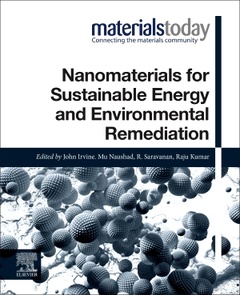Nanomaterials for Sustainable Energy and Environmental Remediation Materials Today Series
Coordonnateurs : Naushad Mu., Saravanan R., Kumar Raju

Nanostructured materials, especially, 1D, 2D and 3D nanostructures, and their engineered architectures are being increasingly used due to their potential to achieve sustainable development in energy and environmental sectors, providing a solution to a range of global challenges. A huge amount of research has been devoted in the recent past on the fine-tuning of nano-architecutres to accomplish innovations in energy storage and conversions, i.e., batteries, supercapacitors, fuel cells, solar cells, and electrochromic devices, bifunctional catalysts for ORR and OER, gas to fuels, liquid to fuels, and photocatalysts, corrosion, electrochemical sensors, and pollution and contaminants removal.
Nanomaterials for Sustainable Energy and Environmental Remediation describes the fundamental aspects of a diverse range of nanomaterials for the sustainable development in energy and environmental remediation in a comprehensive manner. Experimental studies of varies nanomaterials will be discussed along with their design and applications, with specific attention to various chemical reactions involving and their challenges for catalysis, energy storage and conversion systems, and removal of pollutants are addressed. This book will also emphasise the challenges with past developments and direction for further research, details pertaining to the current ground - breaking technology and future perspective with multidisciplinary approach on energy, nanobiotechnology and environmental science
2. Nanomaterials for advanced supercapacitors
3. Engineered nanoarchitectures for high performance solar cells
4. Nanomaterials for gas to fuel conversion, storage and utilization
5. Bi-functional nanocatalysts for water splitting and its challenges
6. Nanostructured advanced materials for hydrogen storage
7. Advanced nanocatalysts for fuel cell technologies
8. Nanoscale materials with different dimensions for advanced electrocatalysts
9. Nanomaterials in electrochemical and biosensors
10. Emerging nanoarchitectures for excellent photocatalysis
11. Nanomaterials for surface coatings, corrosions and paints
12. Nanomaterials for the detection and removal of gases
13. Nanoscale materials for the treatment of water contaminated by bacteria and viruses
14. Nanostructured materials for efficient removal of pollutants in soil
15. Summary and future perspectives of materials and technologies
Dr. Mu. Naushad is working as a full professor in the Department of Chemistry, College of Science at King Saud University, Riyadh, Saudi Arabia. His research interests include wastewater treatment, adsorption, ion exchange, bioremediation, and photodegradation. Dr. Naushad is the author and coauthor of more than 500 refereed journal publications and several books, book chapters, and US patents.
Dr. R. Saravanan is currently a postdoctoral researcher in John TS Irvine’s group, School of Chemistry, University of St Andrews, UK. His research interests include nanoporous materials and nanomaterials-based catalysts for renewable energy and waste water purification
Dr Kumar Raju is currently a Senior Researcher in the Energy Materials, Integrated Energy Research Centre at the Council for Scientific and Industrial Research (CSIR), South Africa. His research focuses on developing advanced materials for energy storage and conversions.
- Summarizes the latest advances in how nanotechnology is being used in energy and environmental science
- Outlines the major challenges to using nanomaterials for creating new products and devices in the sustainable energy and environmental sectors
- Helps materials scientists and engineers make selection and design decisions regarding which nanomaterial to use when creating new produts and evices for energy and environmental applications
Date de parution : 03-2020
Ouvrage de 402 p.
19x23.3 cm
Thème de Nanomaterials for Sustainable Energy and Environmental... :
Mots-clés :
Nanotechnology; Nananomaterials; Remediation; Nanotoxociology; Energy Storage<; BR>



